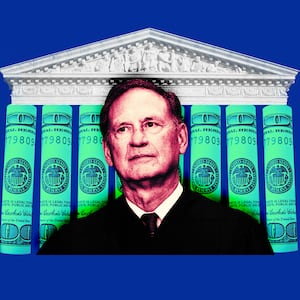The United States Supreme Court finally adopted a code of ethics which removes their embarrassing prior distinction of being the only judges in the country that have no ethics code.
But the toothless code that they have produced—a 15-page document with four pages of obtuse commentary and one entire page devoted just to the justices’ signatures—is too little, too late.
For starters, it’s toothless because it lacks any enforcement mechanism. As Sen. Sheldon Whitehouse put it: “This is a long-overdue step by the justices, but a code of ethics is not binding unless there is a mechanism to investigate possible violations and enforce the rules. The honor system has not worked for members of the Roberts Court.”
Sen. Whitehouse’s observation was echoed by the progressive coalition group United for Democracy, who said: “While it's great to see the Supreme Court finally respond to public pressure and acknowledge that they have serious ethics and corruption issues that must be addressed, the code of ethics announced today is woefully inadequate.”
The liberal advocacy group Take Back the Court Action Fund noted the new SCOTUS code has “53 uses of the word ‘should’ and only 6 of the word ‘must,’ the court's new ‘code of ethics’ reads a lot more like a friendly suggestion than a binding, enforceable guideline.”
The high court appears to be doing damage control in response to the stream of revelations about the justices like the recent ProPublica outing of Justice Samuel Alito not disclosing having been treated to a fishing trip at a lodge that costs $1,000 a day to which he was flown by private jet—a trip that would have lightened Alito’s wallet by $100,000 if he paid for it himself—courtesy of hedge fund billionaire Paul Singer who “has repeatedly asked the Supreme Court to rule in his favor in high-stakes business disputes.”
ProPublica previously reported on Justice Clarence Thomas’ decades-long secret pattern of being flown by private jet and sailing on a superyacht all paid for by his friend Harlan Crow—a conservative Republican billionaire who also paid the $6,000 a month boarding school tuition of Thomas’ grand-nephew—and The New York Times’ reporting on Thomas receiving a loan to buy a luxury RV costing hundreds of thousands of dollars and then having the loan “forgiven.”
Chief Justice John Roberts’ attempt at managing the damage of the exposure of these friends with benefits relationships was to issue a joint “statement” in April as part of his declining to testify before Congress, in which all nine justices signed off on an assertion that they voluntarily follow the ethics guidelines that are mandatory for other federal judges.
The statement claimed it “provide[d] new clarity to the bar and to the public on how the Justices address certain recurring issues and also seeks to dispel some common misconceptions.”
In reality, the only clarity the statement supplied was that the nine justices were unanimous in their myopia over their ethics problems.
As law professor and legal ethics expert Kathleen Clark put it: “[T]here’s nothing in the statement that suggests the court even understands what the problem is.” Nothing in the newly minted ethics code suggests that the justices now get it.
This is evident by the new code’s release being accompanied by a statement from the justices informing us that the absence of an ethics code “has led in recent years to the misunderstanding that the Justices of this Court, unlike all other jurists in this country, regard themselves as unrestricted by any ethics rules.”
The statement is not only patronizing but deviously tries to suggest the code is only issued to correct the public’s ignorant misunderstanding about how the justices “regard themselves.” I would hazard a guess that the 74 percent of the American public that lacks confidence in the court couldn’t care less about how the justices “regard themselves.” What we care about is the lack of an enforceable code of ethics and the lack of transparency about justices secretly living the lifestyle of billionaires.
While the justices’ self-serving code of ethics is ineffectual, other solutions exist. One such solution is the ethics bill proposed by Sen. Whitehouse that would require SCOTUS to establish complaint procedures and adjudication of those complaints by a panel of federal courts of appeal judges.
What the justices think of giving lowly courts of appeal judges the ability to pass judgment upon them is seen in the four pages of “commentary” that accompany the new ethics code. Within the commentary is an explanation of why recusal of justices must be used in limited fashion, owing to the claim that “[t]he loss of even one Justice may undermine the ‘fruitful exchange of minds which is indispensable’ to the Court’s decision-making process.” Implicit in this statement is the idea that lower court judges could not substitute when a justice must recuse themselves because the justices believe that they are of a different caliber than other judges.
This is exactly what is wrong with SCOTUS. They have come to believe that they are “supreme” over not only other branches of government, but also that they are somehow a more elite class of jurists merely because they were appointed to the highest court through a political process.
They need to get over themselves. After all, there is no entrance exam for the Supreme Court. Maybe that should change.









